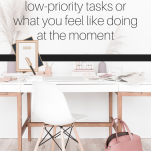Recognizing & Stopping Procrastination Habits & Patterns
“Not everything that is faced can be changed. But nothing can be changed until it is faced.” — James Baldwin
We all occasionally put off doing something. When it becomes a habit and a pattern in our everyday existence, it becomes a problem.
I don’t feel like …
I don’t want to …
I’ll do it tomorrow…
These are all phrases that naturally come out of the procrastinators mouth when they are faced with a task that needs to be done. They often come out sounding whiney with a “poor me” tone to them.
Procrastination happens to everyone, even those who are highly productive. The only difference is the productive persons ability to recognize procrastination or their excuses to be more accurate, for what they are. Then they learn how to beat procrastination using a calculated approach that includes why they procrastinate and then apply strategies to beat it.
Procrastination isn’t just poor time management or laziness. It often comes from negative emotions that keep you hostage from taking action. People put things off because they’re not in the right mood. Then they distract themselves with other tasks. Then when you realize what you are doing, you feel guilty for wasting so much time. Your mood worsens because you feel guilty. Your task deadline gets closer and you feel worse.
This continual loop of self-destructive behavior can only be broken when you discover what is causing you to procrastinate.
Most of us experience quilt when we procrastinate. We become our own worst enemy. We know what we should be doing and what’s in our best interest, but we don’t follow through. The Greeks called it akrasia- the weakness of will; acting contrary to what we know is in our best interest.
Procrastinators are excellent at making excuses. The trick to beating procrastination is to recognize the habits and patterns that cause you to procrastinate and make changes that put a stop to the behavior.
In the previous guide, we learned why you procrastinate and how it can be harmful. In this guide, we’ll be digging deeper into recognizing your procrastination habits and patterns and finding ways to put a halt to them.
Don’t delay. Get started now.
Recognizing Procrastination Habits and Patterns
“I do my work at the same time each day — the last minute.” — Source unknown
Before you can beat procrastination, you have to recognize the habits and patterns of your own procrastination behavior.
You can do that by considering these three factors:
When You Procrastinate – Ask what situations cause you to procrastinate. Is it more at work or home? Do you struggle to finish tasks or to start them?
How You Procrastinate – Ask yourself what you do when you find yourself procrastinating. Are you stalking social media, watching TV or finding unimportant tasks to complete?
Why You Procrastinate – What is causing you to put off doing something? Are you distracted or do you feel overwhelmed?
Do you recognize yourself in any of these patterns?
- You fill your day with low-priority tasks or what you feel like doing at the moment.
- You leave important items on your To-Do list for a long time.
- You start a high-priority task but then go make coffee or surf social media.
- Find yourself reading emails several times without making a decision on what needs to be done.
- You think it has to be the right time to tackle a specific task.
- Notice you are doing unimportant tasks for other people instead of doing the important ones on your list.
- Tell yourself it’s okay to put off doing something you’re afraid to do. You think if you don’t address it, it’ll magically go away, or someone else will do it.
Each of these patterns leads to loss of productivity from procrastination. You probably have other habits or patterns that promote putting things off. Let’s look at a few of them.
Making Excuses – People often come up with excuses or validations to justify our behavior. Each of these excuses though, is simply that: an excuse. Are you using any of these excuses for not taking action?
- Not knowing how to do something, but afraid to or won’t ask how
- Not knowing what you need to do, not having a plan
- Don’t care when something gets done
- Forgetting to do something, intentionally or not.
- Blaming sickness or bad health problems on the delay
- Don’t want to do something because it’s boring, difficult, not interested
- Don’t care if it gets done or not
- Using the habit of always waiting until the last minute to do something
- Saying you work best under pressure
- Had to do something else first before you could do the task
- Blame it on lack of sleep, distractions, family
- I’ll fail anyway so why even start
- I’m not a morning person, I’ll do it later
- This is more difficult for me than it is for others
- Blaming our circumstances- I don’t have an office, don’t have all the things I need to do the task, no one will leave me alone so I can work
Perfectionism – Do you freeze up when it’s time to start on a task or project because you know that it won’t be perfect? If you think you can’t do something until you can do it perfectly, it’s a form of procrastination. And when we’re waiting until the right moment to start- everything has to be perfect first, we may never start. How do you know it won’t be good enough or perfect if you don’t do it?
Avoidance Tactics – Are you putting off doing something because it’s boring or unpleasant? This can be anything from paying bills to opening that letter from the government. Putting off tasks because we’re not in the mood to do it is another form of avoidance.
Unorganized or Lack of Direction – Poor organization can lead to procrastination quickly. You might also be stuck because you don’t know what steps to take to perform a task. When you lack organizational skills or having a prioritized direction for your to-do list, you are more productive. You’re more likely to feel less overwhelmed and find it easier to take action.
Analysis Paralysis – Do you find yourself overanalyzing how to do a task, or a decision? Overanalyzing something keeps you from taking any kind of action. Analysis paralysis can also come from having poor decision-making skills.
Uncomfortable Tasks – Fear of failing or succeeding keeps you from doing tasks that you don’t know how to do. When you fear success, you’re afraid you’ll be swamped with requests to do even more tasks.
Useless Tasks – You spend a good part of each day checking Facebook, searching the internet for non-work-related stuff or working on easy tasks because they are simple to complete.
Delay Work & Decisions – Do you find yourself constantly putting off the work until the night before it’s due? This pattern of procrastination keeps you stressed, in panic mode and you may find yourself missing deadlines often.
We all have certain habits or ways of doing things that can hinder or help us in our daily productivity. Whether your procrastination habit or pattern is big or small, recognize them when you are doing it so you can begin taking steps to halt the behavior.
Stopping Procrastination Habits and Patterns
“No more excuses or procrastination! Stop allowing your days to be stolen by busy nothingness and take calculated steps towards your goals.” — Steve Maraboli
Once you recognize the patterns and habits, you can begin putting a halt to them. You probably won’t break them overnight, but you can begin by setting up strategies that will help you.
In order to get out of the routine and habit of habitually procrastinating, you have to create new routines and order in your life. Begin by taking small, daily steps in that direction.
Every day simply tackle the task right in front of you. Then move on to the next one. It will require hard-work and diligence, but the payoff is discipline, productivity, and happiness. You’ll no longer be lost on what to do, and you will find life is much easier when you don’t put things off or wait until the last minute.
If you have too many tasks to tackle or don’t know what needs to be done, begin by listing all the tasks you need to do on a daily and weekly basis. Then write down the big tasks with the date they need to be done by. Next, break big tasks into smaller ones.
(Here’s a trick that might help on those deadline-oriented tasks: set your deadline in your calendar for a few days before it’s actually due. This tricks your mind into thinking it’s due sooner)
- Commit to doing the tasks. Write the tasks down that you need to complete in your calendar with a specific time each day to do them.
- Give yourself a reward for completing a difficult job on time.
- Get an accountability partner to check up on you. Consider using an online tool like Procraster (http://procrasterapp.com/) to help self-monitor yourself.
- Tackle tasks as soon as they arise. Don’t let them go for another day whenever possible.
- Turn your internal dialog into positives. Instead of “need to” or “have to,” say “I choose to,” which implies that you are in control of your time.
- Get rid of distractions by turning off social media and email notifications.
- Do the most unpleasant tasks first thing each day or at your peak time.
- Focus on the long game especially when doing unpleasant tasks. Identify the long-term benefits of completing the task. Also, identify the unpleasant consequences of not doing the task as well.
- If procrastination is a problem because you are disorganized make it a point to implement strategies to get organized.
- Keep a to-do list so you don’t conveniently forget tasks
- Prioritize your to-do list for tasks you need to focus on first
- Learn to master scheduling and project planning so you can plan your time effectively. Use time-management and task-management apps to help you
- If overwhelm is causing you to delay projects, learn how to break them down into smaller, more manageable chunks. Focus on starting them, working in bursts. Or create an action plan to organize each step of the project.
- If analysis paralysis is keeping you from taking action, look at ways to help you make decisions and move on.
- You learned to procrastinate from your parents, siblings, or another person, who had an “I’ll do it later,” attitude. You need to think about the negative consequences they faced when they procrastinated. Find new role models to mimic, ones who are action takers and have positive results because of it.
- If you procrastinate because you don’t think that you are good enough or you don’t know how to do it, consider taking a course, asking for help or use self-affirming statements like “I can learn as I work on this.”
- You procrastinated because you underestimated how quickly it would take you to do the task. You underestimate how long it takes as well as how quickly you can do it. Instead, start earlier than you think you need to and work on completing the project early.
- You think it has to be perfect and it keeps you from getting started. Instead of putting the importance on doing things perfectly, emphasize the importance of completing on time. Make a list of examples when your perfectionism was unhelpful and of the times when task completion was more helpful.
- You use your depression, anxiety or other condition as an excuse to delay tasks. If you know you have a condition that diminishes your motivation or concentration, get the proper treatment with a licensed therapist. They can help you set achievable goals for your condition and show you how to break your tasks into more manageable steps.
- You procrastinate because you compare yourself to others and find yourself lacking. Instead of comparing yourself, focus on improving yourself and doing your work to your best ability. That’s all anyone asks of you.
- You procrastinate when you are not comfortable with the task or situation. Challenge yourself to step out of your comfort zone and engage in a task, even if it’s only for a little while.
- You really just don’t want to do the task that day. Instead of doing simpler tasks or unrelated task, plan out the big task that needs doing and start it.
While you’re here, Grab these FREE Organize My Life Planners!
9 Ways to Change Your Behavior
“The really happy people are those who have broken the chains of procrastination, those who find satisfaction in doing the job at hand. They’re full of eagerness, zest, productivity. You can be, too.” — Norman Vincent Peale
You recognize you have some habits and poor behavior patterns that are causing you to procrastinate on tasks. Here are 9 ways you can change your behavior to be more productive. You’ll feel more confident, less stressed and your reputation for completing tasks will improve.
- Write down tasks that you’ve been putting off. This puts the project back in the front of your mind so you can’t ignore it.
- What are your feelings towards the task? Procrastination is an emotional reaction with three core emotions driving it. Do you fear that you won’t get the task done on time or well enough? Are you angry because you are doing something you hate? Are you sad because you feel like you can’t do the task? Dig down to identify the emotions behind your procrastination pattern.
- Now get rid of those emotions. Do what you need to so you can release the emotions before they build up inside you. In private, shiver to get rid of fear, stomp around to release anger or have a good cry to release sadness.
- Turn destructive thinking into something constructive. If the task you need to do brings about negative thoughts, find an alternative positive way of seeing the task.
- Break big tasks down into a series of small doable steps. Map out each part of the project.
- Congratulate yourself at each small step you accomplish. Reward yourself in some way. This motivates you and helps keep fear at bay.
- Anticipate obstacles that could pop up along the way to completing the task.
- Take action on the steps or task you’ve been putting off. Fight any resistance you have about doing it. Fight excuses, bad moods or other discouragements you might want to use to keep from doing the task.
- Finish the daunting task and enjoy the win. Accomplishing what you were once avoiding can simplify your work or personal life, giving you more energy, better sleep and a feeling of success.
When it comes to changing your behavior from one of procrastinator to productive accomplishment, it means taking responsibility for your thoughts and actions while forcing yourself to follow through.
Encouragement for Procrastinators
“Don’t wait. The time will never be just right.” — Napoleon Hill
Procrastinators are big avoiders. They use excuses to keep validate why they don’t begin or finish tasks. They find it difficult to make decisions. It can stem from many things as we’ve seen such as laziness, perfectionism, fear, or depression.
- First, forgive yourself for procrastinating. This helps you feel more positive about yourself. And may help you reduce the chances of procrastinating in the future.
- It’s okay to struggle but be intentional about finding something that works for you.
- Remember, you are not the only person who procrastinates, fears, struggles, finds things difficult to do, or feels bored with certain tasks. Reach out to others for encouragement.
- Practice doing what feels difficult or out of your comfort zone every day. It helps you overcome the difficulty and build confidence in your abilities.
- For each task you complete, you’re building good habits and setting good examples for others.
- You’ll feel less frazzled and more at peace when you change your habits to being productive over avoidance.
- It doesn’t have to be perfect.
- By doing what you are supposed to do when you’re supposed to do it you gain the freedom to relax or do what you enjoy.
- You are worth it. The work you do is worth it.
- You can do it.
- Use affirmations to keep your thoughts positive about tasks you don’t enjoy.
Next Steps
Make no mistake about it. Bad habits are called ‘bad’ for a reason. They kill our productivity and creativity. They slow us down. They hold us back from achieving our goals. And they’re detrimental to our health. – John Rampton
Successful people don’t make excuses. They simply push past it. The best way to stop procrastinating is to keep it out of your life. But if you’re already a chronic procrastinator, you can get rid of procrastination by making small, meaningful changes.
Begin by writing out tomorrow’s schedule and to-do list. Create a schedule for every task on your list and hold yourself accountable in some way. Imagine how great you will feel once you have accomplished the tasks.
Overcoming procrastination habits and patterns takes willpower and finding ways to reduce the resistance you have to the task.
You can build your willpower by:
- Meditating
- Using mindfulness techniques
- Having self-compassion and forgiving yourself
- Managing your energy levels
- Time management techniques
- Exercising
- Reducing your decision- making fatigue
You can reduce your resistance by:
- Setting timers
- Focusing on just getting started
- Lowering your standards
- Breaking complex tasks into smaller steps
- Using blocks of time to complete tasks
- Setting up a schedule to complete projects
- Having an accountability partner or app
Breaking your procrastination habits and patterns requires that you actively think about why and when you are procrastination. When you catch yourself making an excuse for example, you are starting to break the habit of procrastination.
Now that you know what you need to do to halt your procrastination in its tracks don’t wait. Start with one task right now you can finish quickly. Then go to the next guide to learn about becoming more productive to beat procrastination.
Don’t forget to grab the FREE Organize My Life Planners by clicking the link below!









Leave a Reply